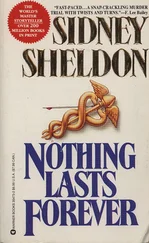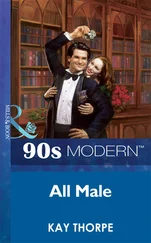He glanced at his watch. 11:51. Nine minutes to Christmas. They were not interested in the Pope or anybody else outside the Klaxon building. Their business was on the fortieth floor. He thought of Steffie again. There was no reason for them to connect him with her. As long as he kept them busy, in fact, she was safe from them. Maybe.
He climbed over the desks to get into his improvised fortress. If he had it figured properly, there were far less than nine that he had to worry about — and another in the lobby. It would take at least two to guard the hostages. Five left. Now that Leland had the detonators, they could do nothing upstairs. So the maximum coming for him was five. If five people were searching for him, he didn't have a chance. Not like this. Not sitting here waiting for them.
But he couldn't see any other choice. They knew that he had gone into the ceiling panels to get over the partition on the fortieth floor. They were looking into anything that could hide a man, and judging by the gunfire, they were shooting at everything that looked questionable.
But with only five, it was impossible for them to watch all the stairwells while they searched the different floors. Still Leland hesitated. He wanted to make sure they met him on his terms. He did not want to get into a shootout in a stairwell with one of them when others could be only thirty or forty feet away.
Now he realized that if they had put five on the search for him, no one was left to even spot-check the stairwells on the thirty-second floor to keep him from escaping to all the floors below. Maybe they figured he wouldn't do that. What kind of connections were they making about him? And why were there so many of them? They wanted to get into the safe. They wanted to keep the hostages calm. They were here for the long haul. They had all the time they needed to find him.
11:56. He had let the girl get to him. The blood on his shirt had made her think he was hurt. Maybe the dirt on his face hadn't let her see his eyes. A nice looking kid. After the burst of .45-caliber bullets had hit her, she had looked as bad as Skeezix down on Wilshire.
He turned on the radio. Channel twenty-six.
"Are you there? Are you listening to me?"
Leland pressed the "Talk" button. He was looking out across Wilshire to the hills — in some places, faintly, he could see Christmas lights winking at random. "What have you got on your mind?"
"We are coming for you. We want our equipment. If you try to resist, we will start shooting hostages..."
"Don't crap me! You want to keep those people quiet!"
"No, no, you don't understand! We will bring them to you, wherever we find you, and shoot them there. Since you don't seem to mind killing women, we were thinking of a child..."
"Hang on, my other line is ringing." Leland turned the radio off. He was watching a small crag in Laurel Canyon, trying to keep his eyes on it. There: one, two, three, four flashes of light. Dark again. He started counting. Nine seconds. One, two, three, four. He would have to climb out of here and go to the light switch hear the stairwell if he wanted to return the signal. Four? What did four flashes mean? He climbed out. Now the interval was ten seconds. One, two, three, four. Okay, but what did it mean? He hurried. When he flicked the switch, the lights dazzled his eyes. Swell. He ran back to the window, trying to keep his eyes on the spot on the hill. Four flashes, a pause, four more, fast; then the light came on permanently and seemed to waver. It was three miles away. Somebody was swinging it in a circle. Four. Four flashes meant four, as in ten-four, because he had sent the signal by radio. Message understood.
He wept.
12:02.
"Merry Christmas," he whispered. He turned on the radio. "You still there? Sorry to keep you waiting. You've got more problems than just me. The other guy tells me that the cops are coming."
"I'm not surprised. We are prepared to be here for many days — weeks, if necessary."
Leland didn't answer. If it were true, why would he say so? Why, indeed. If they were prepared to last for weeks, the only problem they had, the one condition they couldn't control, was Leland himself. They knew exactly what they were doing, even to the talking on the radio. They had to consolidate their position. They wanted the detonators — and him dead — before the police began to understand the situation.
The whole thing was a lot clearer to him now. He hadn't done that badly. He'd made a pest of himself and weakened their ranks and slowed them down. They'd expected a siege. The hostages were part of it. Something in that safe brought it all together. Some highflying sharpshooters in an oil company had just sold a bridge to the military junta in Chile — that was what he knew.
In itself that might be enough, but the old cop in Leland didn't like it. He felt like a cop again — in fact, wearing a badge wasn't a bad idea. If the place was going to be crawling with the LAPD, it might just save his life. He took the badge out of his wallet, and turned the back into the light. THIS MAN IS A PRICK.
He put it on. At this point he'd rather have the hot coffee and doughnuts that always went with it.
He could use a cup of coffee. All the best police decisions were made over hot, bad coffee served in rough, earthenware mugs. If he slipped past them on the thirty-second floor, they would be permanently stymied, left to improvise the rest of the way. But the price was too high: he would lose his options with Steffie and the kids. The hostages would have to take their chances with whatever went down, as the guys out here liked to say, which he knew meant a SWAT assault — or worse, like the National Guard.
But if he stayed up above the thirty-second floor and they caught him, they would have the detonators and be back in business. Leland knew what they would do with him; he didn't need the questions of a taxi driver in St. Louis to remind him.
There was a third choice, although it involved some risk. The way things were going, he would be more useful a bit further along, when the locals could make their presence felt. The only place to hide was one that had already been searched, and the only one not blocked by members of the gang was the thirty-second floor itself.
It was worth it. He might even be able to keep his eye on Steffie and the others. He had the radio — the only problem would be in locating a channel someone was monitoring.
Now there was more shooting — it sounded directly overhead. To hell with the plastic for now. He would remember where it was, as well as his little fortress in the corner.
On the thirty-third floor, he made his way through the maze of offices to Wilshire Boulevard. Empty. The traffic had been light-to-nonexistent five hours ago. He had been here that long. One puttering motorist would tell him that the area was still open.
Here came a prowl car, number one-four-nine, the numbers on the roof, visible from the air. A black-and-white, they called it out here. Doing fifteen miles an hour. Leland could almost make out the face of the officer driving. He was looking this way. He was looking very carefully, trying to appear unconcerned, a look Leland had seen on policemen around the world. He was looking at the steps. They were onto it — they were here. But it could be hours before they were here in force. It might be daylight before he knew anything more than he did now. When was daylight? Around seven. A solid seven hours away.
The elevators started, and it sounded like all of them at once. He had been told no lie: these people were prepared to deal with the police. This was the time to move, when their attention was directed elsewhere. He felt a frightening wave of exhaustion. If this was going to continue until dawn, he would have to find a place where he could hole up and sleep.
Читать дальше











